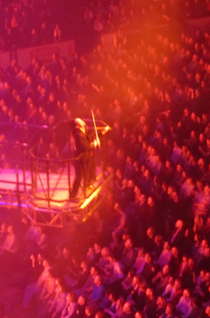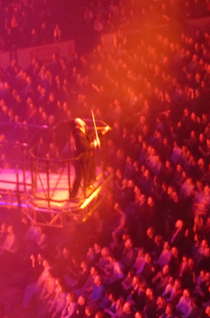 Saint Thomas Aquinas 1225 – 1274 Saint Thomas Aquinas was educated by Benedictines but eventually chose to join the Dominican order, much to his family’s dismay. He continued his education in Paris and Cologne under the tutelage of Albert the Great. During this time, the writings of Aristotle had been rediscovered and were causing ferment in the Christian world of philosophy and theology. Why would a follower of Christ have any interest in the work of an ancient pagan philosopher? Did Aristotle’s writings threaten the Church and its mission to spread the word of God?
Saint Thomas Aquinas 1225 – 1274 Saint Thomas Aquinas was educated by Benedictines but eventually chose to join the Dominican order, much to his family’s dismay. He continued his education in Paris and Cologne under the tutelage of Albert the Great. During this time, the writings of Aristotle had been rediscovered and were causing ferment in the Christian world of philosophy and theology. Why would a follower of Christ have any interest in the work of an ancient pagan philosopher? Did Aristotle’s writings threaten the Church and its mission to spread the word of God?
As I read about Thomas this morning on one of my favorite sites, Universalis, a phrase in Martin Kochanski’s short commentary on Thomas caught my attention-“Truth cannot contradict truth: if Aristotle (the great, infallible pagan philosopher) appears to contradict Christianity (which we know by faith to be true), then either Aristotle is wrong or the contradiction is in fact illusory.”
This quote reminded me of a conversation I had years ago with my then five-year-old daughter who is now an archeologist. One night, when I climbed the steps to check on her, I found her wide awake, looking at the ceiling and the glow in the dark moon stuck to it.
“What’s wrong, honey?” I asked.
She turned her wide eyes toward me and said, “I don’t know what to do. I love God, but I love science, too. And the Bible says God made the world in seven days and some people say dinosaurs and people lived at the same time, but science says that isn’t true. She took a deep breath. I don’t know what to pick.”
I sat on the bed beside her. Her anguish was as real as I imagine that of some of Thomas’ contemporaries wrestling with Aristotle.
You dont have to choose. The Bible isnt a science book. The people who wrote it werent scientists and they werent trying to tell us how the world was really created. No one was there when it happened. No one knows. But, they were trying to tell us the truth, as they understood it: Somehow, God started it all. Scientists are looking for truth, too. Both religion and science are searching for truth and truth will always lead us to the same place: to God.
I ran my fingers through her silky hair. She was watching me, hearing what I said.
Dont worry, Em. You dont have to choose. Just keep looking for the truth.
The muscles in her face relaxed and a smile lit up her eyes.
Ohhh, she sighed. Thats good. Cause I dont know which one I would have picked.
She turned over and drew the covers up under her chin. I kissed her and, as I stood up to leave I heard her saying, I DO love science.
Many in Thomas Aquinas’ day feared the truth when it was spoken by Aristotle. The Church feared the truth of Copernicus and Galileo, but no amount of suppression could keep it from eventually bringing people from knowing that the planets orbited the sun. Such knowledge has not been the undoing of the Church. And truth as we learn of it will not be the undoing of our faith either.
We must not fear the truth. We must be open to hearing it from people and places we might not expect to speak it to us. What we know as “truth” about many things has changed over decades. Questioning whether or not women have souls is unthinkable now. Not always. What we understood as “truth” about about race, about sexuality and gender identity has changed. Decades of scientific exploration and research has deepened our knowledge of the universe, the earth, and our impact on it.
We need not only “truth tellers,” but also “truth hearers.” Thomas was a “truth teller” in his time. Who are the “truth tellers” today? Do we listen to them? Does our Church, our government, those in power?
Distinguishing was is true from what is not has never been an easy task. But, I stand by what I said to my daughter: Truth will always lead to God.
 PHOTO: Mary van Balen
PHOTO: Mary van Balen  PhOTO: Mary van Balen This winter has been mild, giving us some almost balmy sunny days. One morning the light coming in my bedroom window was so strong that I grouped plants from around the room onto one dresser so they could benefit from the rays. I sat on my bed and looked at them, enjoying the shine on their leaves and imagining the roots stretching and moving around in the warm soil.
PhOTO: Mary van Balen This winter has been mild, giving us some almost balmy sunny days. One morning the light coming in my bedroom window was so strong that I grouped plants from around the room onto one dresser so they could benefit from the rays. I sat on my bed and looked at them, enjoying the shine on their leaves and imagining the roots stretching and moving around in the warm soil. 
 PHOTO: Mary van Balen
PHOTO: Mary van Balen  Our seats were in the top tier, front row. If the plexiglass extension of the low wall in front of us had not been there, I might have rolled right over and landed in someone’s lap below. I had a similar feeling once before at my one and only attendance at an Ohio State football game. I was at the top of the stadium, and looking down at the field below, was sure I was going to fall onto its green turf.
Our seats were in the top tier, front row. If the plexiglass extension of the low wall in front of us had not been there, I might have rolled right over and landed in someone’s lap below. I had a similar feeling once before at my one and only attendance at an Ohio State football game. I was at the top of the stadium, and looking down at the field below, was sure I was going to fall onto its green turf. I enjoyed it all, drinking in the energy, the music, the passion. The audience, all 2100 of us, included every age and race and style. Christmas stories were told and carols were sung in a style, while never imagined by their creators, that still spoke to the heart. The first half of the show was all Christmas. The second half was a mix of other themes and songs familiar to TSO fans.
I enjoyed it all, drinking in the energy, the music, the passion. The audience, all 2100 of us, included every age and race and style. Christmas stories were told and carols were sung in a style, while never imagined by their creators, that still spoke to the heart. The first half of the show was all Christmas. The second half was a mix of other themes and songs familiar to TSO fans. Today’s headlines include an
Today’s headlines include an  PHOTO: Mary van Balen – vase
PHOTO: Mary van Balen – vase  Friends are coming to dinner tonight. We meet once a month for dinner, conversation, and prayer. This is the fist gathering I have hosted in my new place, and I am looking forward to it. I cleaned, put on “Vespers” by Rachmaninoff, and lit candles. What a wonderful way to celebrate the feast of St. Nicholas. Three gold coins sit on each plate, remembering’ the story of Nicholas helping a poor man and this three daughters by tossing a bag of gold coins into the young women’s window, providing a dowery for each. One story claims the gold fell into their stockings, and thus, we hang Christmas stockings to be filled with small gifts.
Friends are coming to dinner tonight. We meet once a month for dinner, conversation, and prayer. This is the fist gathering I have hosted in my new place, and I am looking forward to it. I cleaned, put on “Vespers” by Rachmaninoff, and lit candles. What a wonderful way to celebrate the feast of St. Nicholas. Three gold coins sit on each plate, remembering’ the story of Nicholas helping a poor man and this three daughters by tossing a bag of gold coins into the young women’s window, providing a dowery for each. One story claims the gold fell into their stockings, and thus, we hang Christmas stockings to be filled with small gifts.
 Moon, Jupiter, Venus PHOTO: Mary van Balen Today’s readings are full of light. The morning Psalm (69): “Lord answer for your mercy is kind; in your great compassion, turn toward me. Do not hide your face from your servant; answer me quickly, for I am in distress…”
Moon, Jupiter, Venus PHOTO: Mary van Balen Today’s readings are full of light. The morning Psalm (69): “Lord answer for your mercy is kind; in your great compassion, turn toward me. Do not hide your face from your servant; answer me quickly, for I am in distress…”  Last night I attended a lecture by John Allen, journalist and senior correspondent for the National Catholic Reporter and senior Vatican analyst for CNN. The topic of his presentation was “The Future Church.” Mr. Allen listed ten trends that are shaping the Catholic Church today and picked a few to comment on at length. One, “The Rise of the Global South,” was a topic of conversation at a late dinner with friends after the talk. The numbers he presented were overwhelming.
Last night I attended a lecture by John Allen, journalist and senior correspondent for the National Catholic Reporter and senior Vatican analyst for CNN. The topic of his presentation was “The Future Church.” Mr. Allen listed ten trends that are shaping the Catholic Church today and picked a few to comment on at length. One, “The Rise of the Global South,” was a topic of conversation at a late dinner with friends after the talk. The numbers he presented were overwhelming.